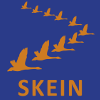Island School – a Seeking Momentum School
Island School is an all-through school (having been an 11-16 comprehensive until September 2014). The majority of students (86%) are from Black and Minority Ethnic backgrounds and the proportion of students who speak English as an additional language is well above average (around 40%). Over half (56%[1]) of students at Island School are eligible for Free School Meals. The proportion of students with special educational needs is close to the national average.
The percentage of students achieving five or more A*-C GCSEs including English and maths has been stable at just under 40% mark for some years. In 2014, the figures were 38% for first entry or 46% for best entry. The value added analysis (Best 8) suggests that the school’s scores in 2014 were slightly below the national average, particularly for disadvantaged students. In 2014, students’ progress and achievement in English were close to national averages. The progress of disadvantaged students in English was particularly impressive: 84% of them made expected progress compared to the national average figure of 75%. Students’ results in maths and science were lower, at 42% (compared to 55% nationally) and 48% (compared to 72% nationally) respectively. In its last Ofsted review, Island School was assessed as Requiring Improvement.
The senior leadership team at Island School have developed a strategic response to this grading, aiming to adapt a few strategies capable of securing progress on many fronts, and devised a School Improvement Plan which aims to achieve Outstanding status. The SIP lays out a series of ambitious targets, including raising the overall percentage of five or more A*- C GCSE results to 60.3% by 2015 (from 45.8% in 2014). It also sets out objectives and milestones for improving the quality of teaching, achievement of students, and leadership and management. To achieve these ambitious goals the school has put in place a number of staff support and development systems including , for example, the use of the whole school TEEP CPD programme and use of video evidence in professional learning (via IRIS Connect).
Island is strong on professional learning. The SLT explicitly model leadership, and the CPD environment overall features the use of Blue Sky portfolios, collaboration (including planning), 22 trained coaches, and the use of impact evidence to inform CPD. Performance management processes are currently being realigned to better link staff and student learning, but targets remain somewhat generic. Colleagues have expressed a desire for more support from specialists, especially in circumstances where they are teaching outside their own subject. The school makes use of IRIS Connect; this is thought useful but time consuming. Professional learning is mostly focussed on whole cohorts rather than on strategies that work for particular sub groups.
School leaders set challenging expectations of students, but there is still room for improvement – the school now needs to make sure it challenges all students, and is making progress on this with co-ordinators for More Able and data handling. There is much good teaching in the school and teachers are aware of the importance of contextualisation and the use of open questions. But the overall quality of teaching and learning in Island is mixed. Problems with stretch and challenge were corroborated by survey evidence.
Relationships between staff and students are complex, with some positive survey responses but also some very negative ones, and peer relationships seem to follow a similar trend. Half of the students surveyed stated that there was a disruption at least once per lesson. The school’s behaviour policy is not yet in a position where it can enhance the learning culture in the school, and pedagogy, especially the development of inspirational teaching, seems to be hampered by an emphasis on behaviour management and control rather than behaviour for learning.
Island’s values and vision are made very clear to all, including during recruitment and via staff appraisals, the School Improvement Plan, and other documents. The senior leadership team have a number of key ambitions, crucially to eradicate inadequate teaching, and to raise teachers’ expectations of what students can achieve. The SLT have made both CPD and the rationale behind approaches visible to all, such as via their CPD policy and “public forum” CPD sessions in which SLT members participate. Student progress data is added to ePortal on a half-termly basis, and data monitoring is conducted using 4 Matric and RAPP meetings, with Blue Sky being used for performance management. Lesson observations track teacher progress against milestones, and the SIP is underpinned by data analysis, both in terms of arriving at objectives and milestones, and monitoring progress towards them. The SLT’s carefully selected and prioritised strategies and actions are poised to take full effect once a more effective approach to behaviour for learning is in place.
[1] ‘Ever six’ FSM figures, source - DfE performance tables
